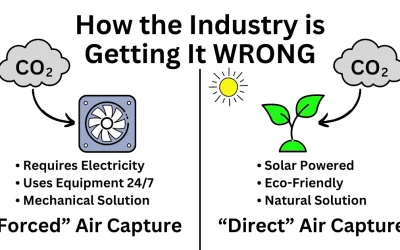Once upon a time in a world grappling with the challenges of climate change, a group of scientists and environmentalists gathered to seek solutions. Amidst the discussions of renewable energy and conservation, an ancient technique was reimagined for the modern era: the creation of biochar, a form of charcoal produced from plant matter and intended not for fuel, but as a means to capture and store carbon. This old method, reinvented, promised not just to reduce emissions but to actively remove carbon from the atmosphere. It was a hopeful solution, but one that needed careful consideration and understanding.
What is Biochar?
Biochar is produced through a process called pyrolysis, where biomass (like wood, manure, or agricultural waste) is heated to high temperatures in the absence of oxygen. This process transforms the biomass into a stable form of carbon, resistant to decomposition. The key feature of biochar is its incredibly porous structure, which increases soil fertility and helps in water retention, thus aiding agriculture.
Carbon Removal Capabilities
The cornerstone of biochar’s environmental impact lies in its remarkable ability to sequester carbon, presenting a significant stride in combatting climate change. At the heart of this capability is the process of pyrolysis, which effectively locks carbon into a stable, solid form. This is crucial because, unlike the carbon in raw biomass that would typically be released back into the atmosphere as CO2 or methane through decomposition or combustion, the carbon in biochar is stable for hundreds to thousands of years.
A pivotal study by Lehmann et al. (2006) sheds light on the quantifiable benefits of this process. The research reveals that one ton of biochar has the potential to sequester approximately three tons of carbon dioxide. This finding is not just a scientific curiosity but translates into a powerful tool in the arsenal against global warming. By converting agricultural wastes and other organic materials into biochar, we are effectively removing carbon dioxide from the carbon cycle for a considerable duration.
Further emphasizing biochar’s potential in carbon removal, the International Biochar Initiative, a leader in this field, projects that with sustainable and widespread adoption, biochar practices could offset up to 12% of global greenhouse gas emissions by 2030. To put this into perspective, this level of offset is equivalent to removing over a billion cars from the roads, a statistic that underscores the profound impact biochar could have on global emission reduction efforts.
Moreover, these estimates are not static. As technology advances and more efficient methods of producing and utilizing biochar are developed, its potential for carbon sequestration is likely to increase. Studies are ongoing to optimize the pyrolysis process and to explore the use of different feedstocks for biochar production, each with its unique carbon sequestration capacity.
Biochar emerges not just as a method of carbon storage but as a beacon of hope in mitigating climate change. Its ability to sequester carbon efficiently and for long durations, coupled with ongoing advancements in its production and application, mark biochar as a key player in the quest for a sustainable and climate-resilient future.
Agricultural Benefits
Biochar’s role extends far beyond its capacity for carbon removal; it plays a pivotal role in enhancing soil health, a critical aspect in the sustainability of agricultural practices. The transformation of organic materials into biochar results in a substance rich in carbon and porous in nature, which when introduced to soil, acts as a catalyst for improving soil quality and plant growth.
A significant study in this field is the meta-analysis conducted by Jeffery et al. (2011), which offers a comprehensive review of the effects of biochar on crop yield. This analysis, encompassing numerous studies and a variety of conditions, found that the application of biochar to soil can increase crop yields by an impressive 10-16%. This increase is attributed to several interlinked factors, primarily related to the enhancement of soil properties.
One of the key benefits of biochar is its ability to modify soil pH. Soils that are either too acidic or too alkaline can hinder plant growth and nutrient uptake. Biochar, often slightly alkaline in nature, can help balance soil pH, bringing it to a level where plants can absorb nutrients more efficiently.
Moreover, biochar’s porous structure provides an ideal habitat for soil microbes, which are essential for nutrient cycling and organic matter decomposition. This increased microbial activity enhances the soil’s nutrient availability, a factor crucial for plant growth. The porosity of biochar also improves soil aeration, allowing roots to breathe more easily and reducing the risk of root diseases.
Another critical aspect is biochar’s ability to retain nutrients and water in the soil. Its high surface area and porous nature mean that nutrients and water can be held within the soil structure more effectively, reducing the need for frequent watering and supplemental fertilization. This property is particularly beneficial in areas with poor soil conditions or in regions facing water scarcity.
In addition to direct benefits to soil and plants, biochar application in agriculture has broader environmental benefits. It reduces the leaching of nutrients into waterways, thereby mitigating the risk of eutrophication in aquatic ecosystems. It also decreases soil emissions of nitrous oxide, a potent greenhouse gas, further contributing to climate change mitigation efforts.
The incorporation of biochar into agricultural practices offers a multifaceted approach to enhancing soil health. By improving soil pH, boosting nutrient availability, enhancing microbial activity, and aiding in water retention, biochar not only boosts crop yields but also contributes to more sustainable and environmentally friendly farming methods. The research by Jeffery et al. underscores the significant potential of biochar in transforming agricultural practices, paving the way for a future where agriculture is both productive and sustainable.
Water Conservation and Pollution Reduction
Carbon removal is not the only benefit of biochar. The porous nature of biochar is one of its most distinctive and beneficial characteristics, particularly in the context of agricultural water management and pollution control. This unique structure plays a crucial role in improving soil’s water retention capacity, which has far-reaching implications for irrigation practices and water conservation in agriculture.
A pivotal study in this area by Major et al. (2010) sheds light on the quantifiable impact of biochar on water usage in agriculture. Their research found that soils enriched with biochar could potentially reduce water consumption by up to 50%. This significant reduction is primarily due to the porous structure of biochar, which acts like a sponge, absorbing and retaining water in the soil. This property is particularly valuable in arid and semi-arid regions where water scarcity is a major challenge, and in areas with sandy soils that typically have low water retention capacity. By maintaining moisture for longer periods, biochar-enriched soils can support crop growth with less frequent watering, leading to more efficient water usage and potentially reducing the reliance on irrigation.
The benefits of biochar go beyond water conservation. Its porous structure also plays a vital role in filtering out pollutants from soil and water. Biochar has been shown to adsorb a variety of organic and inorganic contaminants, including heavy metals, pesticides, and herbicides, reducing their availability and mobility in the soil. This filtering effect is crucial for maintaining soil health and preventing the contamination of groundwater and nearby water bodies. As a result, biochar application can be an effective strategy in mitigating the risk of soil and water contamination from agricultural run-off and other sources.
Moreover, the ability of biochar to adsorb pollutants has broader environmental implications. By immobilizing contaminants, biochar can help in the remediation of polluted soils, making it a valuable tool in environmental clean-up efforts. This aspect of biochar is particularly relevant in areas where soil contamination is a major concern, offering a sustainable and efficient method for improving soil and water quality.
The porous nature of biochar makes it a valuable asset in sustainable agriculture and environmental management. Its capacity to enhance water retention in soils leads to more efficient use of water in agriculture, while its ability to filter out pollutants contributes to the reduction of soil and water contamination. The study by Major et al. highlights the potential of biochar to significantly reduce water consumption in agriculture, offering a path towards more sustainable and environmentally friendly farming practices.
Economic and Social Implications
The production of biochar presents a unique opportunity to stimulate rural economies, creating a new market demand for biomass and fostering employment opportunities in local communities. This aspect is particularly crucial in areas where agricultural or forestry byproducts are abundant but underutilized. Transforming these byproducts into biochar not only adds value to otherwise waste materials but also creates jobs in biochar production, distribution, and application. The process involves a range of activities from biomass collection and transportation to the operation of pyrolysis facilities and the distribution of the final product. This value chain can support a variety of job roles, including skilled positions in facility operation and management, offering a significant economic boost to rural areas.
However, while the economic benefits of biochar production are clear, it is imperative to balance this with environmental and ethical considerations. One of the key concerns is ensuring that the increased demand for biomass to produce biochar for carbon removal does not lead to unintended negative consequences, such as competition with food production or deforestation. It’s crucial that biomass for biochar comes from sustainable sources, such as agricultural residues, forestry byproducts, or specially grown energy crops that do not displace food crops or natural forests. Sustainable sourcing of biomass is not only essential for the environmental integrity of biochar production but also for maintaining the social license to operate within communities.
The potential conflict with food production can be mitigated by using residues from crops or by integrating biochar production with existing agricultural practices in a manner that enhances rather than competes with food production. For instance, crop residues, which are often burned or left to decompose, releasing greenhouse gases, can be converted into biochar, providing both an environmental benefit and an additional revenue stream for farmers.
Similarly, the risk of deforestation can be addressed by implementing strict sourcing guidelines that prioritize waste and residue materials over virgin wood. This approach ensures that forest resources are conserved, and biochar production contributes to circular economy principles by utilizing waste materials effectively.
The sustainability of the biochar industry, therefore, hinges on careful resource management and the adoption of ethical practices. This includes not only the responsible sourcing of biomass but also considering the entire lifecycle of biochar production, from the energy used in pyrolysis to the transportation of the final product. By adhering to sustainable practices, the biochar industry can not only provide economic benefits to rural areas but also contribute positively to environmental conservation and climate change mitigation efforts.
While biochar production offers promising economic benefits, particularly in rural economies, its long-term viability and positive impact depend on a balanced approach that prioritizes sustainable and ethical practices. This careful balance ensures that the growth of the biochar industry supports not just economic development but also environmental sustainability and social well-being.
To conclude, the story of biochar is one of rediscovery and hope – a testament to humanity’s ability to learn from the past and innovate for a sustainable future. As we continue to explore this ancient yet futuristic technology, it holds the promise of not just removing carbon from our atmosphere but also rejuvenating our soils, supporting our farmers, and paving the way for a greener planet.





